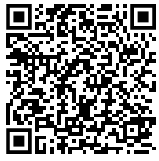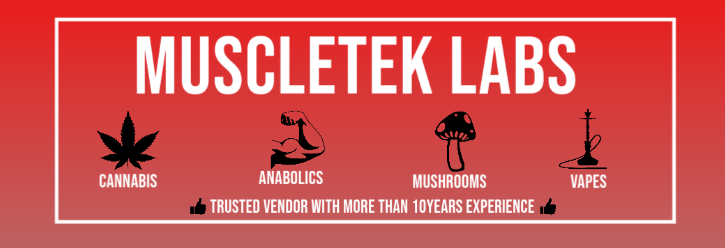Are VPNs Legal? Your Rights to Using VPNs Explained
Are VPNs legal in your country? We explain your rights when using a VPN, and what you can or can’t do.
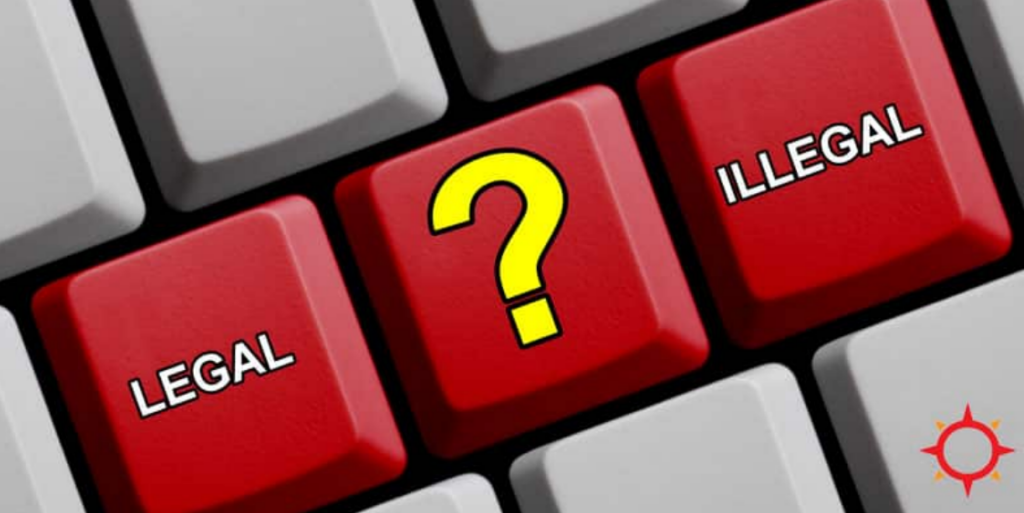
In the United States, and most Western democracies, it is perfectly legal to use a VPN. However, they can be associated with illegal online activity and are not legal in every country. VPN use is banned or heavily monitored in less democratic nations, including China, Russia, and Cuba.
In this article, we explain what’s legal and illegal about using Virtual Private Networks, and we’ve created a handy table that includes the legal status of VPNs in a number of countries where the technology is contentious.
We’ve also independently tested the best VPNs, and only recommend VPNs that are safe and legal. NordVPN is the best VPN by far, and thanks to obfuscated servers that hide the fact you’re using a VPN, we’d recommend it if you’re in a country where VPN use is restricted.
Choose a safe, legal VPN that’s great value for money Surfshark is a legal VPN that you can run on an unlimited number of device for just $2.49 per month Try Today 30 Day Free Money Back Guarantee
Is It Illegal To Use a VPN?
In short: using a VPN is perfectly legal in most countries, including the U.S, but not all countries. That doesn’t mean, though, that you are free to conduct illegal activities with a VPN enabled.
A VPN protects your privacy but does not excuse you from being reprimanded by the law for theft, unlawful purchases, or any other crime as dictated by the laws of the country you are in.
VPN Legality By Country
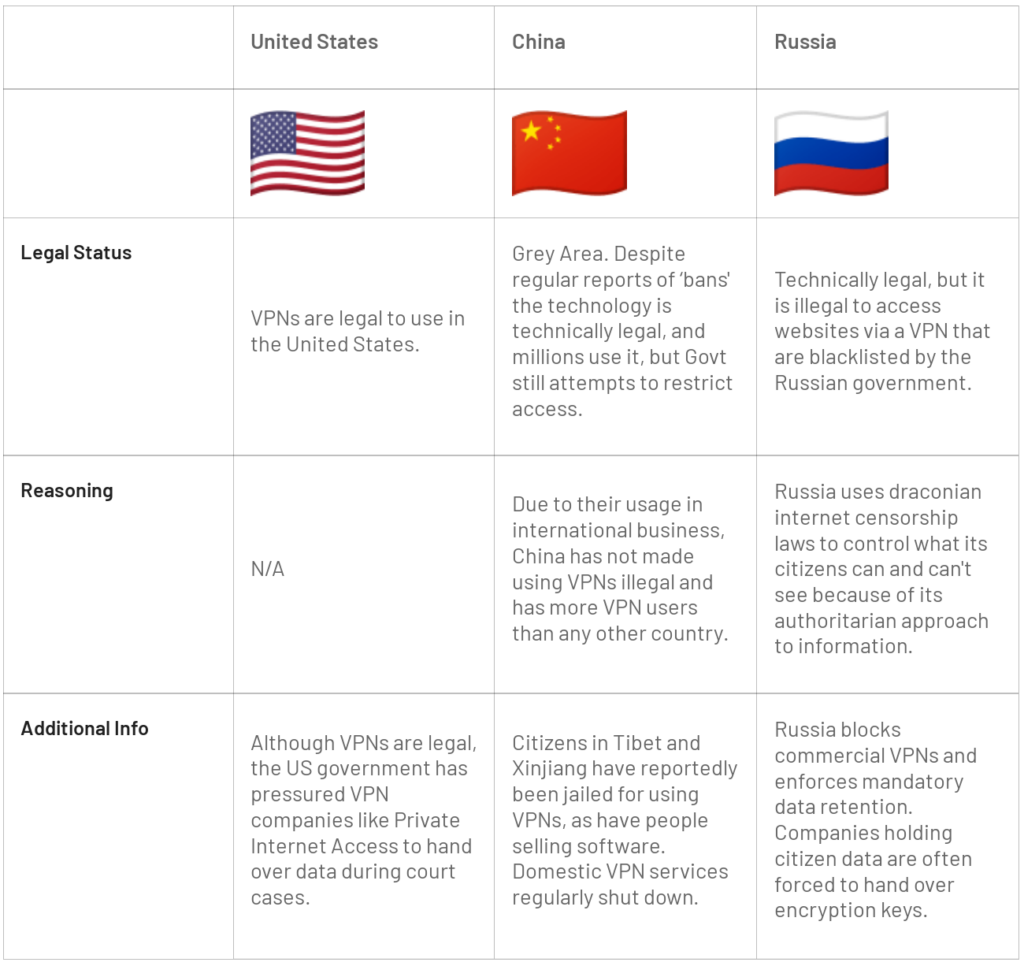
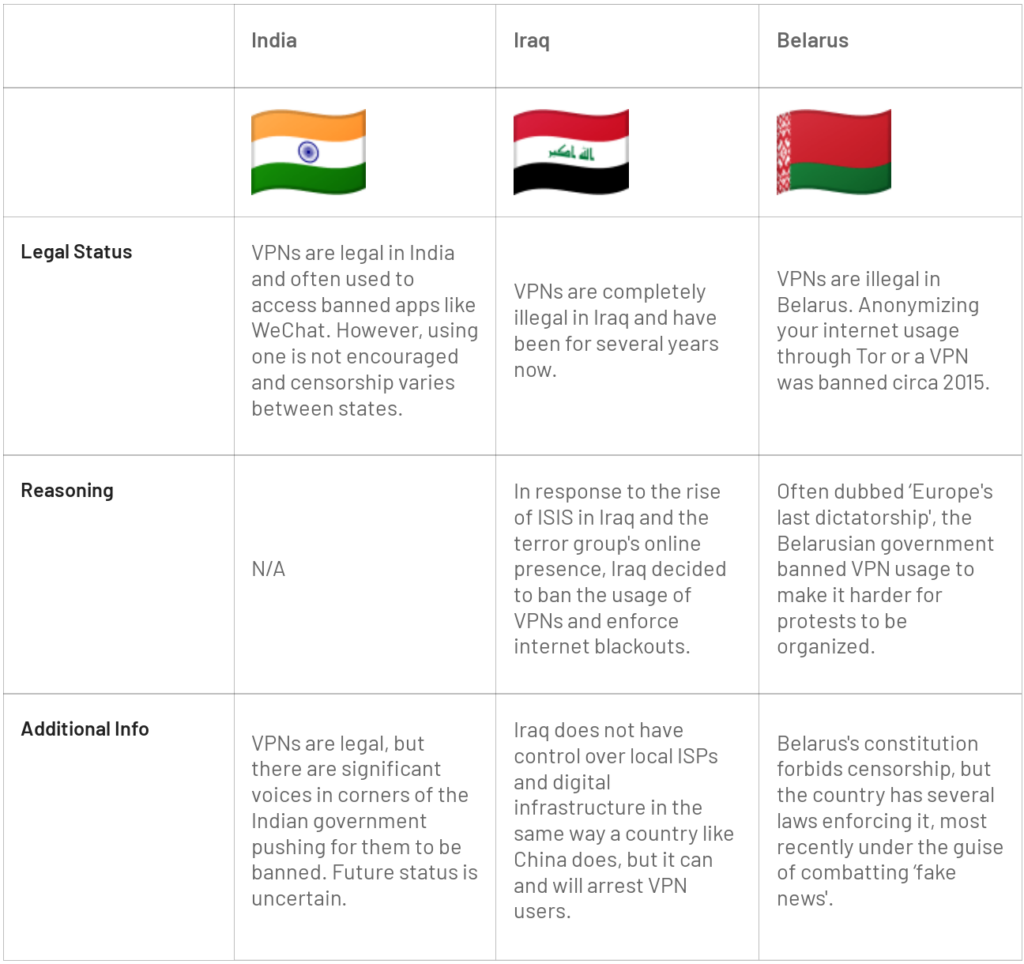
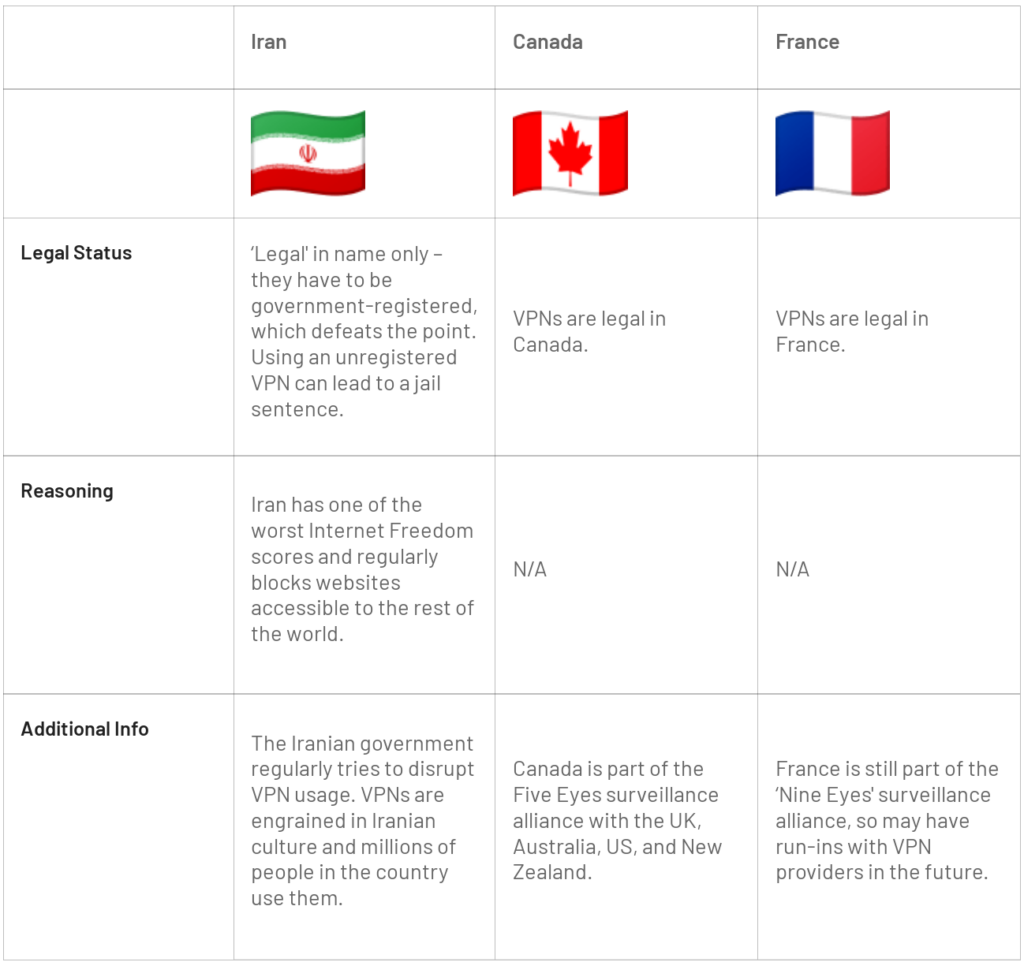
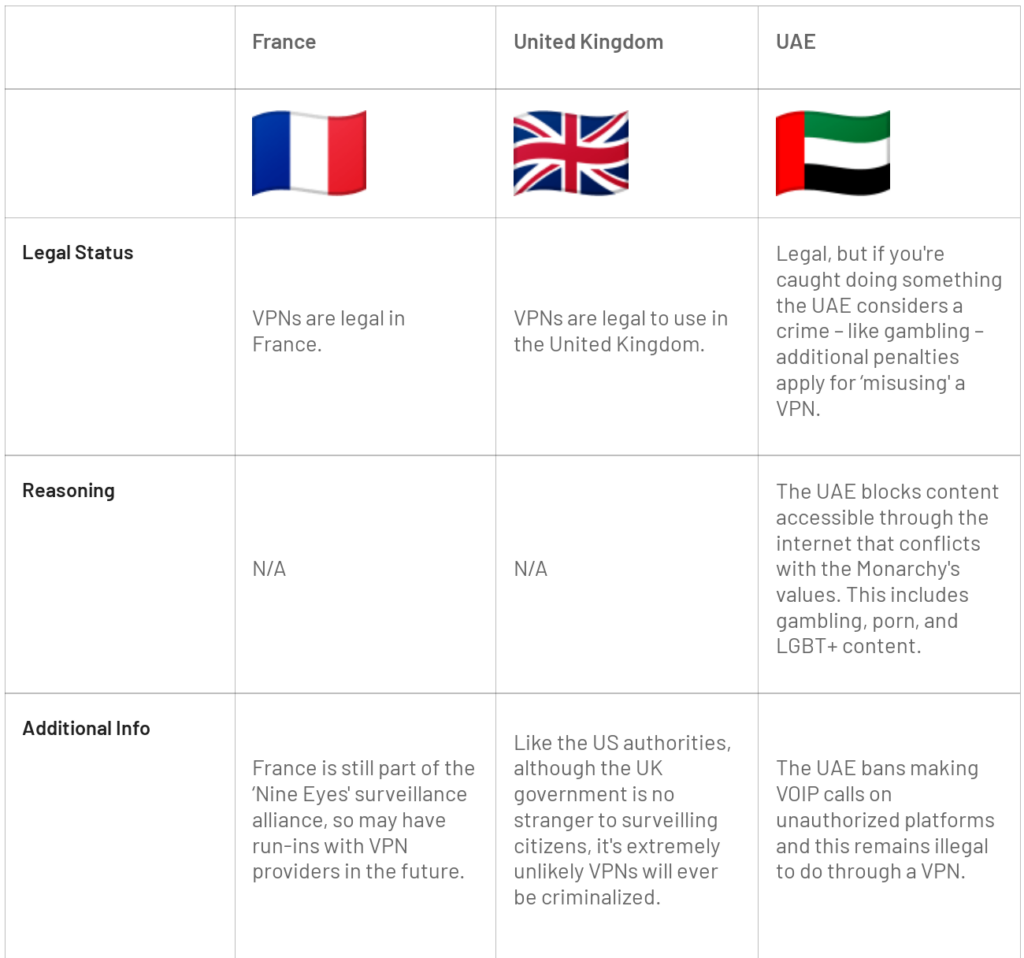
Key Takeaways…
- You can use VPNs in the U.S. – Running a VPN in the U.S. is legal, but anything that’s illegal without a VPN remains illegal when using one (e.g. torrenting copyrighted material).
- VPNs are banned by a few countries – Some countries, including China, Russia, Iraq, and North Korea, restrict or ban the use of VPNs.
- VPNs use can breach terms of service – It isn’t illegal to access services such as Netflix over a VPN, though it does breach their terms of use, and streaming services are getting better at blocking VPNs.
- Law enforcement can demand information – some VPN providers have and will share user information with the authorities when requested, whereas others have been unable to provide it due to their no logs promise.
Ready to choose a great VPN? See all of our expert reviews of the best VPN services to choose.
Can You Legally Use a VPN in the US?
There are currently no laws prohibiting or restricting the use of VPNs in the U.S. and Canada. It’s also legal to use VPNs in many other countries around the world, including the UK, Australia, and Europe (except Belarus). At a basic level, you cannot be prosecuted for simply using a VPN, and thousands of people living in the USA use VPNs on a daily basis.
VPNs are used widely in countries like the US for security reasons. Citizens use VPNs to protect themselves on unsecured, public Wifi networks and from intrusive government surveillance.
There is a multitude of legitimate reasons why you might find a VPN handy. These use cases can broadly be split up into two categories: security/privacy and entertainment. VPNs are used widely by companies and individuals in countries like the US for security reasons and the US government accepts this – which is why it hasn’t outlawed them. Citizens and businesses (‘B’ denotes a business-specific use case) concerned about their privacy and safety online use VPNs to:
- Protect themselves on unsecured, public Wifi networks
- Shield themselves from government surveillance
- Prevent websites from tracking their every move
- Protect themselves from malicious websites and programs
- Block advertisements on search engines and websites
- Ensure only employees are accessing company networks (B)
- Transfer sensitive and confidential information (B)
- Whitelist IP addresses for accessing certain networks (B)
VPNs are also used for entertainment purposes. Due to the fact VPNs mask the IP address of users connecting to their servers, Amazon Prime, Hulu, and any other site you visit won’t be able to tell where you’re located in the world – so you can bypass dreaded ‘this content is not available in your country’ screens. On top of movies buffs, US gamers use VPNs for a number of reasons, including:
- Preventing ISP Throttling – some gamers need to hide what they’re playing from their internet service provider. ISPs sometimes slow down your internet speeds if they can see you’re performing data-intensive tasks like playing a multiplayer online game, which is known as ISP or bandwidth throttling.
- Reducing Ping Time – Gamers use VPNs to reduce ping time, which (in a gaming context) is the time it takes for data to be transmitted between a gamer’s console or PC and the gaming server they’re connected to. One way this is done is by connecting to a VPN server geographically closer to the gaming server.
This doesn’t, however, stop VPNs from being embroiled in court cases and legal quagmires relating to individuals breaking the law whilst using their service. The US Government, for instance, has subpoenaed a number of VPN companies over the years in an effort to obtain activity logs related to criminals. As you can see from this table from US-based VPN Private Internet Access’s (PIA) website (last updated in March this year), it’s not uncommon:

When this happens to a reliable VPN provider like Private Internet Access, the company had no logs to give over because, well, they were telling the truth about not keeping any logs. To clarify, the US government was not accusing PIA of any wrongdoing, just someone using its services.
If you’re looking for a VPN to use whilst you’re in the US, our research has shown that Surfshark is one of the best, thanks to its excellent features and ease of use.
Which VPNs are Legal to Use?
All consumer VPNs are legal to use in countries where VPN usage is legal. Some countries force citizens to register VPNs with the government, such as China, rendering unregistered, consumer VPNs ‘illegal’ or at least heavily restricted.
Which VPNs are safe to use is another question entirely. Free VPNs, for instance, usually have a catalog of security issues, shady marketing practices, and sketchy track records that show they don’t care about For this reason, we recommend sticking to the services we’ve recommended below.
Free VPNs may look appealing, initially, thanks to their subscription-free service, but you have to ask yourself: how are they making their money? Usually, the answer is concerning. In the past, free VPN companies with millions of unwitting subscribers have been found guilty of:
- Allowing advertisers to harvest customer data (Betternet)
- Stealing bandwidth from users and letting others use it (Hola)
- Logging your activity whilst you use the service (Hola)
- Expose your IP address due to leak (Hoxx VPN)
- Logging activity, getting breached, and exposing it (UFO VPN)
The ones we’ve picked out in the table below, however, have excellent privacy features and won’t treat you like a dispensable, sellable data point. All of the VPNs listed below are completely legal to use in countries where consumer VPN usage is not criminalized, restricted or forbidden.
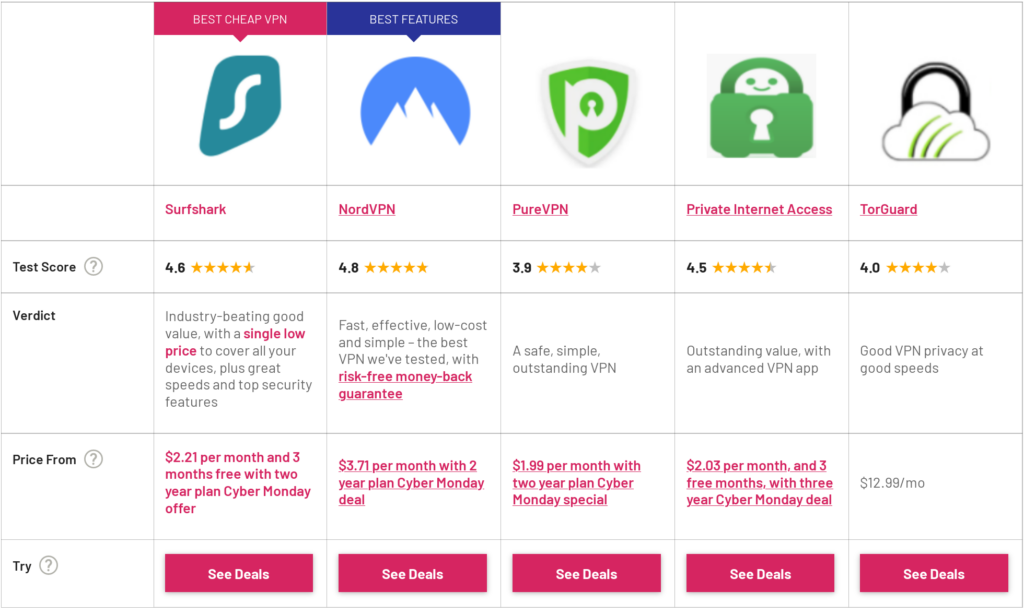
Where Is It Illegal To Use a VPN?
Countries ruled by authoritarian governments that don’t consider civil rights and/or their citizen’s ability to speak and think freely as important tend to be the ones that ban or restrict VPN use. Citizens of such regimes may try to use VPNs to get around the strict government monitoring of online activities, or the blocking of certain sites. The governments, in turn, block or restrict their use. There are several countries where VPNs are:
- Completely illegal – Belarus, North Korea, Iraq, and Turkmenistan all have explicit laws dictating that VPNs are banned and you’ll be punished if you’re caught using them in these territories.
- Legal, but must be registered – Countries like Oman and Russia technically permit VPN usage, but they have to be government-approved. In somewhere like Russia, companies are regularly forced to give up confidential data and logs at the request of the government, and a lot of consumer VPNs have moved their servers out of Russia for fear of them being seized.
- Heavily restricted – In countries like China, even though VPNs are widely used, the government takes steps to prevent citizens from using them, such as removing VPN apps from the China App Store. Similarly, Egypt blocks access to VPN websites to dissuade its citizens from using them, despite the fact they’re not technically illegal, as does Turkey.
Unsurprisingly, a number of other countries that scored poorly in our Internet Censorship Rankings attempt to restrict VPN usage. They do this by deploying tactics such as:
- Banning consumer VPNs from app stores
- Tightly policing/banning platforms that host VPN software
- Forcing citizens to register their VPNs with the government
- Blocking as much VPN traffic as possible
- Attempting to seize servers and obtain encryption keys
- Creating a ringfenced or walled internet (like Russia’s Rusnet)
- Arresting individuals that are selling VPN software
Scroll back to the top of this article and check out the table, where the legality of VPNs from country to country and the reasoning behind their legal status is explained in more detail.
“While VPNs themselves aren’t illegal in the US and many other parts of the world, VPNs are sometimes used by people to disguise the fact that they’re carrying out activities that break the law.”
Despite their illegality in certain territories, activists and citizens still use VPNs because they have few other choices. But that doesn’t mean everyone using a VPN is acting virtuously or in a benign fashion.
VPNs and Illegal Activities
While using a VPN itself is rarely unlawful, certain online activities remain illegal, whether you’re using a VPN or not. These may include:
- Illegal file-sharing – Also known as torrenting, this is where users simultaneously download and upload copyright-protected content (such as music, movies, and games) between each other over the internet.
- Hacking – Gaining unauthorized access to computers or networks belonging to other companies or individuals, either to disrupt activity, carry out acts of fraud or steal data, is illegal.
- Buying, selling, or downloading on the dark web – The dark web is an under-the-radar area of the internet, where a great deal of illegal activity occurs, such as buying or selling drugs, weapons, and other illicit materials, or accessing illegal pornography.
- Cyberstalking – It’s illegal to stalk someone online and cover your tracks using a VPN.
Why are there Legal Issues Around VPNs?
VPNs use encryption to make your connection to the internet private. By using a VPN, you can make yourself anonymous online and mask your browsing activity. For this reason, VPNs are sometimes used by people to disguise the fact that they’re carrying out activities that break the law.
However, the vast majority of VPN users aren’t breaking the law, and are just performing one of the many legitimate tasks a widely-used provider like NordVPN can help you with, from preserving their own privacy to streaming sports.
To complicate matters further, if you use a VPN to make it look as though you’re located somewhere else in the world while you’re online, you could find that your online activities are bound by the laws of the country where the server is situated – not just by the laws of the country you’re really accessing the internet from.
VPNs Violate Websites’ Terms of Service
It’s important to note, however, that VPN users can and regularly do breach the Terms of Service of various websites, especially streaming services like Netflix. Some people wrongly perceive or presume this to be illegal or verging on it, but in fact, there’s zero chance you’ll face legal consequences for doing so.
“In some cases, use of a VPN can breach your terms of service for a platform (such as Netflix), rather than the law itself.”
VPNs can be used to make it appear as if you’re located in another country by routing your connection through a proxy server that’s physically situated abroad. If you’re doing this in order to access a service that’s geo-locked to a specific country – for example, if you wanted to stream US Netflix while you’re not in the US – you’ll violate Netflix’s terms of service:

As we covered, importantly it’s not illegal. But if you use a VPN to access Netflix, such as PureVPN, from within a country where the service doesn’t currently operate, you are effectively in breach of contract.
Netflix reserves the right to “terminate or restrict your use of our service if you violate these Terms of Use or are engaged in illegal or fraudulent use of the service”. However, this is highly unlikely to happen to you as millions of people use VPNs to access Netflix US and other libraries from different territories, and there’s little evidence that Netflix has – or can – even do this to an individual.
What Netflix and other streaming services are doing at an increasingly frequent rate, however, is blocking the IP addresses known to belong to VPN servers. That means, unfortunately, that not all VPNs can access Netflix successfully – so if that’s a priority for you, check out our round-up of the Best VPNs for Netflix.

Seen enough? Find the highest quality paid VPNs today.
Do you need a VPN for personal use or business? Personal Business
Is It Legal for my Business to Use a VPN?
Yes, your business can (and should!) use VPNs legally. There’s just one caveat here, which is that any business operating within the list of countries that have banned VPNs will not be able to use VPNs.
In countries like China, for instance, VPNs are widely used despite the government’s aversion to them because blanket banning them completely would be economic suicide – many foreign businesses would leave the country.
Business VPNs are useful for connecting to a corporation’s internal network as well as to the public internet, making them the perfect tool for employees working remotely who regularly need to access company files and other confidential documents. top-of-the-range Business VPNs like NordVPN’s Nordlayer can also serve to build an ironclad internal network across multiple offices. Whether it’s business or consumer-focused, however, there are tonnes of benefits of using a VPN.
Can My Employees Use a VPN When Abroad?
In most cases, a business’s employees can use a VPN when working in another country. But it depends on the country. If it’s legal in the country, we’d highly recommend the practice: It’ll keep your employees’ private data safe while they’re on otherwise unsecured networks.
If your business is expanding to a new country, getting to grips with the specific rules and regulations relating to VPN use is essential.
However, it must be stressed that the legal status of VPNs in each country is unique and will exist against a backdrop of historical government action (or inaction, in nations where VPN use is legal and unrestricted) against providers and individuals using their software, and this will be used to sculpt future policy relating to the technology. For the purpose of simplicity and clarity, we’ve organized the attitudes of certain countries into broad categories like ‘heavily restricted’, but really, every territory will have its own story.
If you’re expanding your business to a new country or territory or thinking of setting your employees already working abroad up with a business VPN, getting to grips with the rules and regulations of that territory specifically is essential.
Countries Where VPNs are Restricted But Not Illegal
This includes places like China, which doesn’t like the fact its citizens and businesses operating in the country use VPNs, but essentially tolerates their existence in society due to the catastrophic effects a ban could have on international business.
Indeed, China has a repuation for going easier on VPNs when used for international business. Employee VPN usage for business purposes will require employees to know the ins and outs of Chinese laws relating to VPNs, so they know what they can and cannot do. In all cases when visiting a country known for restricting VPN use, it’s best to check with someone in the know before firing up a top business VPN provider like PureVPN Teams.
Countries Where VPNs Are Illegal
Countries where VPNs are outright illegal are typically run by governments that foster a generally hostile or difficult environment for foreign (and sometimes all) businesses and their employees to operate in, like Belarus or Iraq.
In these sorts of territories, there will likely be additional, non-VPN-related rules and regulations that break from the common corporate practices of places like the US or ongoing, violent conflicts/civil and political unrest that will need careful consideration upon approach. In fact, if you’re either already operating in a territory like this or planning to, whether VPNs are illegal or not may be the least of your worries.
If VPN usage is essential to your business, but your staff could end up in jail for simply using them in a territory you’re operating in, then you have to ask yourself: ‘can I conduct/continue business operations in this territory without a VPN?’ If the answer is no, there are only two options: provide employees with sufficient information and resources to perform their jobs safely and in line with local laws, but without a VPN, or cease business operations there.
Can You be Fined or Prosecuted for Using a VPN?
Unless you live in a country where VPNs are banned or restricted, you won’t face a penalty for using a VPN. However, in the U.S. and other countries where VPNs are allowed, you could face prosecution for any unlawful activities you carry out while using a VPN.
Using a VPN may not provide you with any protection in criminal cases, either. Many VPNs – including some that claim not to keep any logs – retain some information about their users and may reserve the right to provide this and any other relevant data to authorities, if requested. Market-leading VPNs that definitely don’t log your activity whilst you use their service sometimes retain other types of data to perform things like troubleshooting:
We collect information about whether you have successfully established a VPN connection on a particular day (but not a specific time of the day), to which VPN location (but not your assigned outgoing IP address), and from which country/ISP (but not your source IP address). This minimal information assists us in providing technical support” – ExpressVPN privacy policy
Court documents show that VPN provider logs have been used in at least two recent cases (United States of America vs Ryan S Lin and United States of America vs Suzette Kugler) to track and prosecute individuals for illegal activities carried out online while using a VPN.
Do I Need a VPN With Obfuscated Servers?
Yes, it’s definitely recommended that you use VPNs with obfuscated servers in a country where VPN usage is restricted or illegal like China.
One of the ways that VPN-averse governments enforce restrictions or bans on the technology is to identify traffic coming from or going through VPN servers and block it. Remember, VPNs may decouple your IP address from your internet activity, but your ISP or government would still be able to see you’re using a VPN if it wanted to, just not what you’re doing whilst you use it
How do they do this? Well, an ISP could perform deep packet inspection (DPI) on your traffic, which is a data process that entails viewing, in great detail, all the packets of data being sent over a computer network. Firewalls deployed by businesses and governments – and anyone else wanting to assert control over a given network – have the ability to perform Deep Packet Inspection too.
Stealth or obfuscated servers essentially scramble the metadata relating to your traffic to the point where it no longer looks like VPN traffic and instead mimics normal traffic
VPN traffic is encrypted, whereas normal traffic isn’t, so it’s quite easy to differentiate between them with a process like DPI. If you’re connected using the OpenVPN protocol, for example, your packets of data will have the OpenVPN signature attached to them, so your ISP could see you’re using a VPN.
However, a trend that is now quite widespread in the VPN industry is the provision of obfuscated servers and protocols. These stealthy servers essentially scramble the metadata relating to your traffic to the point where it no longer looks like VPN traffic and instead mimics normal traffic. VPN companies call the technology they use to do this different names, but they all do the same thing.
So, if you’re in a country that has restrictive VPN laws and you have to use a VPN, make sure it’s a provider like NordVPN or Surfshark that has obfuscated servers or protocols available, so anyone looking at your traffic with just think you’re using connecting to the internet normally.
Your Rights Around VPNs
Your rights vary depending on several factors, including the terms of service offered by the VPN you’re using, the country you’re using the VPN in, and the terms and conditions of any services you access while using a VPN.
Before you sign up with a VPN, check its terms of service and its privacy policy to make sure you’re happy with them first.
Most VPNs will make it clear that carrying out illegal activities is not allowed and that users must assume all liability for any criminal behavior. You will also usually find a clause stating how a given provider deals with legal requests relating to a suspected fraudulent, abusive, or illegal and indications about the relationship the VPN company maintains with law enforcement authorities.
Before you travel abroad, always make sure you check to see whether or not VPNs are legal in the country you’re visiting. If you’re traveling to a country where VPNs are illegal or restricted, you’ll need to disable any VPNs on your devices.
Ready to choose a VPN? Check our VPN comparison table to help you pick a fast, secure VPN service

Get a Legal VPN for less than $3
Verdict: VPNs Are Legal in the US
VPNs are legal security tools to use in the US and the vast majority of countries worldwide. In fact, they’re an expert-recommended way to stay secure and private when connecting to the internet or an internal company network.
However, that doesn’t mean they’re legal or safe to use everywhere – so if you’re away on business and planning to use a VPN, check the legality of the software in the country you’re planning to go to. Remember, any illegal activity conducted over a VPN remains just as illegal – whatever country you’re in – and using a VPN to access geo-restricted content produced by any given streaming platform may violate its terms of service.
If you’re hoping to start using a trustworthy VPN today for personal or business use, we’d recommend one of the top paid options like Surfshark, NordVPN, or PureVPN. Try Surfshark Try NordVPN Try PureVPN









